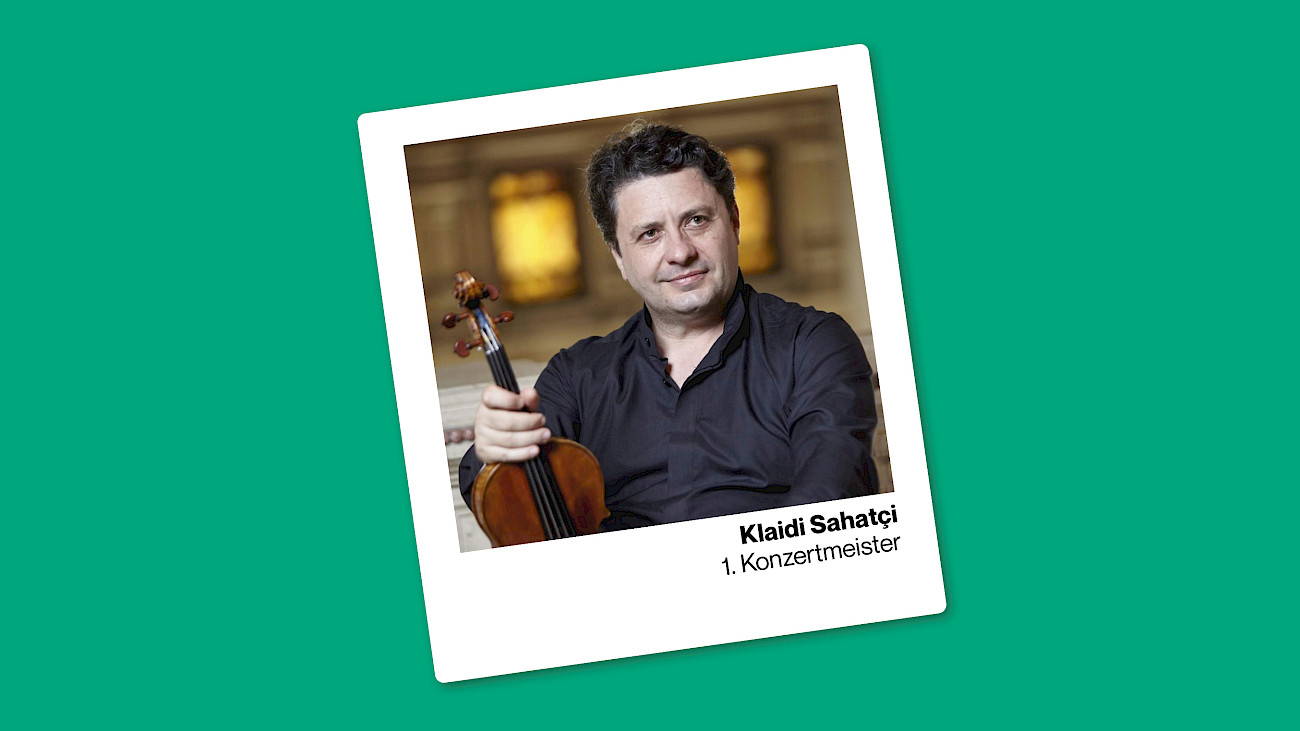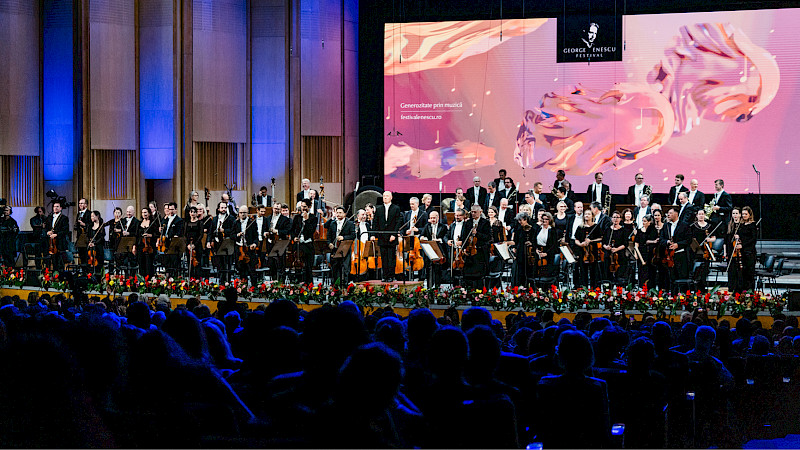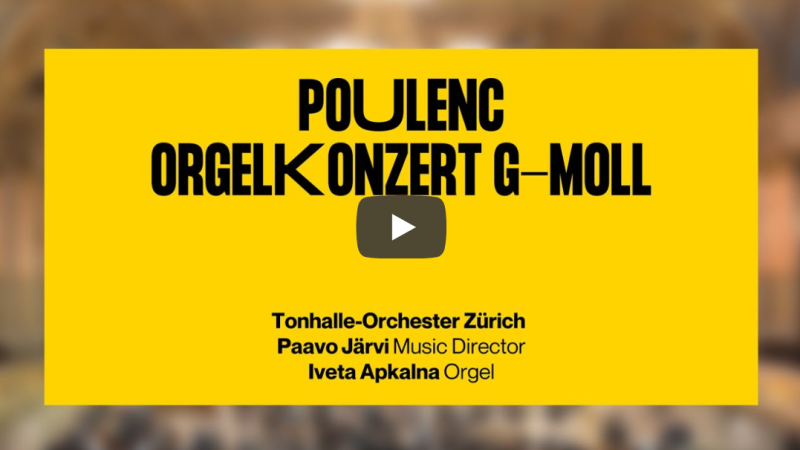
Escaping narrow worlds with the violin
Klaidi Sahatçi has been one of the concertmasters at the Tonhalle-Orchester Zürich for the past 14 years. Had his childhood not assigned him a different path, he might have become an astronaut.
Marx, Engels, Stalin: these were the faces of Klaidi Sahatçi’s childhood. And they were omnipresent. At home, there was a portrait of the dictator Enver Hoxha. Klaidi was born 50 years ago in Albania – in what was then the People’s Socialist Republic of Albania, which existed in this form between 1944 and 1990. A few years after Klaidi was born, the totalitarian communist regime completely sealed off the country from the outside world.
Klaidi says he had a happy childhood. “My father never talked to me about there being anything wrong with the system. Never. Perhaps he was afraid I would do what children do – repeat what they hear at home.” The consequences would have been unthinkable. If the family had been critical of the regime, they would have been put in a concentration camp in some nickel mine. Despite his fluent German, Klaidi speaks English when he talks about this time.
Belief in the best country in the world
Quiche with salad. A lunchtime chat in the bar behind the Tonhalle Zürich. Klaidi has been a concertmaster at the Tonhalle-Orchester Zürich since 2009 – together with Julia Becker and Andreas Janke, “in a family trio,” as he describes the three of them. He says he couldn’t be more grateful. For his home, which is his orchestra. And for the one he shares with his wife Silvia, who like him is a violinist. Grateful for their son Alexander, who is about to take his school-leaving exams. He too plays the violin and piano at such a level that he will at some point have to take a decision. But one thing at a time.
As a child, Klaidi was unaware that anything around him might be unusual, being familiar only with the propaganda and believing that he lived in the best country in the world. Klaidi’s father was an engineer, his mother a director at the state television company. Middle class. “But what does middle class mean in a communist system? Everyone lived equally frugally.”
He shrugs his shoulders. His parents had no choice; they themselves suffered under the dictatorship. In her position, his mother was under constant, strict surveillance. And his father grew up as the son of a successful lawyer. The dictatorship forced him and his family into unworthy accommodation. “It wasn’t just about reputation and prestige; it was about hurt feelings, stolen hopes.” Klaidi grew up near the centre of Tirana in a Greek Orthodox family, whereas more than 60 percent of the population was Muslim. In 1967, however, the communists declared Albania an atheist state and banned all religious practice.
Pleasure – with no choice
Klaidi’s most vivid childhood memories revolve around the violin. His father, himself an avid amateur guitarist, took him to a music teacher when his son was six years old. Klaidi loved the piano, but he loved the idea of being able to carry an instrument around with him even more. The teacher told him to show him his hands first. “They are small, your hands,” he said. “Maybe they’ll be good for the violin. I had no choice – not even later.” Klaidi’s warm voice sounds conciliatory. His parents bought him a mass-produced German violin, which cost thirty dollars at the time. Yet his parents earned eight dollars each per month. Klaidi still keeps the instrument at home – “as a reminder of my roots.”
As a little boy he enjoyed this beautiful object, the violin; it piqued his curiosity. And he was happy to have joined the music school. But things became increasingly difficult. His father was ambitious: “He was obsessed with performance.” Klaidi has a sister six years younger, who never played an instrument. At ballet school, the person in charge didn’t like her feet, so the issue was dropped. Now living in Milan, she is an English teacher with a passion for theatre.
On tour with the secret service
Klaidi talks about an attitude that he observes in Switzerland nowadays. He says that children are given an instrument for pleasure, and they can engage with it as long as they like. His own experience was completely different: “Everything in my life revolved around progress.” It would have been unthinkable to invest time and money in something if it didn’t lead anywhere.
“Classical music became my support – a vast, inner world within a confined outer one.”
As a youth, Klaidi sometimes dreamt of another life somewhere outside this system. But escape was out of the question. In those days, every concert tour undertaken by his orchestra was monitored by the secret service. If someone dared to run away, their entire families would be rounded up – right down to their second cousins. “Classical music became my support – a vast, inner world within a confined outer one.” Even if he found that world as a result of pressure.
At some point, Klaidi knew that he wanted nothing in life other than to play the violin. He was fifteen at the time, attending a special school where there was plenty of time to practise: “I have the state to thank for that support,” he says, laughing cynically. When he was seventeen or eighteen, he experienced how everything was taken away from the family of an acquaintance. “Klaidi, everything’s going wrong here,” he said. “What they’re telling us is all lies.” Klaidi began to understand the meaning of propaganda.
Not at home in the pit
Klaidi doesn’t visit Albania much since leaving the country at the age of twenty when the regime fell. He exchanged his passport for an Italian one and moved to Milan. He feels like a European at heart.
In Milan, Klaidi broadened his knowledge of the violin and, after two years, completed his diploma with top marks and an honorary mention. He continued his studies with Salvatore Accardo at the Walter Stauffer Academy in Cremona, and later with Boris Garlitzky in Lyon.
In his first years in Italy, Silvia sat with him among the first violins in the orchestra of the Milan Conservatory; he liked her from the very first day. He observed her. Until one afternoon he invited her for a walk. The pair have been married for many years. When he played in prominent positions in the Orchestre national de Lyon, the Orchestra della Svizzera Italiana and the Zürcher Kammerorchester, she went with him.
When Klaidi’s father died in 2000, the couple felt the need to be closer to his family; his mother still lives in Milan. And so it happened that he worked for three years as First Violin in the Teatro alla Scala Orchestra for three years. However, Klaidi didn’t feel at home in the pit: “A dozen performances of ‘La traviata,’ a dozen of ‘Don Carlo’… I wanted to get back to the great orchestral literature, to get back on stage.”
Moreover, he has come to appreciate that everything is a little more regulated in Switzerland. “At those big theatres in Italy, temperament rules. There are often polemical discussions; the chaos is ubiquitous.” Moreover, Klaidi’s days stretched deep into the night. Nevertheless, the couple has kept a small pied-à-terre in Milan.
Chamaeleon with a leadership role
When the position of concertmaster at the Tonhalle-Orchester Zürich became vacant in 2009, Klaidi didn’t hesitate for a second. Even at the time, the name of the orchestra was music to his ears. He loved David Zinman’s Beethoven, the intimate ensemble playing, which he had come know well during his past years playing in the Zürcher Kammerorchester. When Klaidi talks about the Tonhalle-Orchester Zürich, he refers to it as “my orchestra.” He is proud of being part of the ensemble: “We play at a really good level.” He likes the fact that Paavo Järvi sees the orchestra at the top. “It makes us see ourselves up there too.”
In his capacity as concertmaster, Klaidi considers himself part of a team. “We work together; we play subordinate roles as individuals within the orchestra.” He wants to serve the music. “It can’t be about anything except a shared objective.” Whenever Klaidi is able to contribute something that will turn a concert into a sensation, he has a sense of fulfilment.
When there is friction within the orchestra, he asks himself: “What is my task here?” He took the job because he feels musically confident rather than because he wants to be above other people within a hierarchy. Whether he is a good leader or not is for others to judge; it’s not for him to talk about it. “Balance has always been more important to me than extremes; anything radical annoys me. There are people who see this quality as a weakness.” He is a chameleon: Klaidi adapts to the circumstances and to his environment.
Listening to the silence in space
Klaidi frequently performs as a soloist – in his own orchestra and abroad – as well as being a sought-after chamber musician, a founding member of the Aoide Trio, and a professor at the Lugano Conservatory. It all fits together well. “People who play with discipline in an orchestra and are involved in chamber music – either as soloists or as teachers – remain motivated and inspired. These areas all enrich one another. I see that here with my colleagues, day after day.”
Klaidi particularly enjoys making music with his son Alexander, whom his wife began teaching the violin when he was three years old. At five, he started learning the piano, which his parents felt was a complementary instrument that would make sense. Today, Alexander plays both so well that a career in music seems likely.
“I don’t say, ‘Do whatever you enjoy, my child,’ because I know how important discipline is. But he has a choice. That’s a crucial difference.”
Klaidi says he is seeking a middle ground in his son’s upbringing between the experiences of his own youth and what he observes in today’s society: “I don’t say, ‘Do whatever you enjoy, my child,’ because I know how important discipline is. But he has a choice. That’s a crucial difference.” Whatever path Alexander eventually chooses, Klaidi wishes him passion. “We spend many years working – too many to muddle through unhappily for purely economic reasons.”
Where does Klaidi find peace? Whenever he makes music. To this day, he has retained his curiosity about his instrument. And as a boy he never dreamt that he would once play a Stradivarius. “But sometimes,” he says, “I want to be an astronaut. To listen to the silence on another planet. What a blissful notion.”
He likes to pause for reflection in his quiet flat in Meilen on Lake Zurich. The sight of the water calms him. In his thoughts, he pushes the mountains far away, for they trigger a sensation of confinement in his mind. And Klaidi has bade farewell to confined worlds – once and for all.





